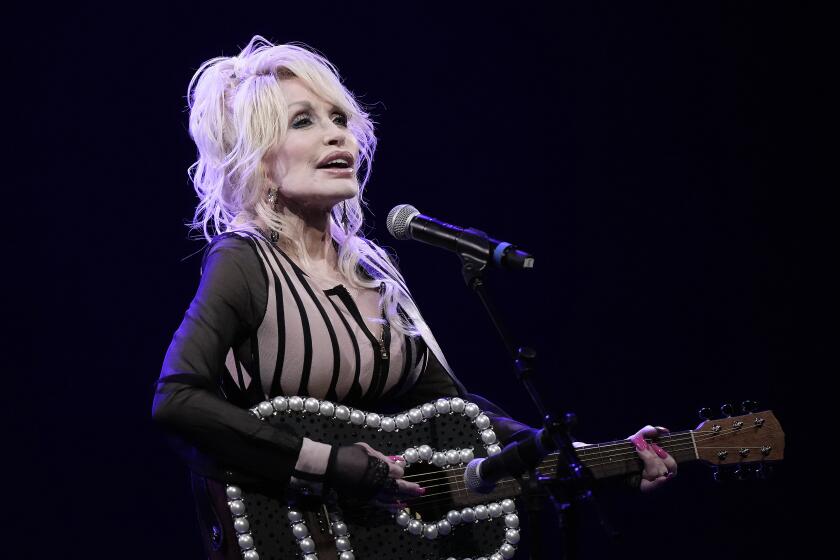ABC Sued Over Use of Hidden Cameras
- Share via
Two Hollywood casting workshop owners were shocked last fall to find themselves performing on ABC.
The network’s “20/20” newsmagazine had used hidden cameras to catch them conducting controversial sessions, at which job-hungry actors paid to sharpen their skills in front of casting directors who might eventually hire them for coveted movie and TV roles.
State regulators ultimately moved to restrict the practice. But the workshop operators and 14 actors who were caught on tape filed suit Wednesday, accusing the Walt Disney Co.-owned network and some of its high-profile employees of violating California’s strict privacy protection standards.
An ABC spokesman said he hadn’t yet seen the complaint. But he added, “We stand by our report, and we plan to vigorously defend ourselves.”
The suit is the latest in a series of legal disputes that have turned hidden camera work into a high-risk business for news organizations, “reality” programmers and others who tape without permission.
Reality shows such as HBO’s “Taxicab Confessions” and the Sci-Fi Channel’s new program “Scare Tactics” have stepped up hidden camera use, even as most news organizations, stung by litigation, have backed away from the practice. Last month, “Scare Tactics” was sued by an unwitting subject who said she was secretly taped while being terrorized by an actor made up as a homicidal space alien.
“It’s a million-dollar decision every time you do it,” said Neville Johnson of undercover taping and the cost of defending legal challenges. Johnson, of Los Angeles-based law firm Johnson & Rishwain, is an aggressive privacy litigator who filed the current suit -- and who beat ABC four years ago in a California Supreme Court case that helped shape some of the country’s toughest secret-taping restrictions.
That case, Sanders vs. ABC, involved surreptitious taping for an investigation of telephone psychics. The court ruled that workers have a right to expect that their conversations won’t be recorded by co-workers and that news gatherers don’t have an unrestricted right to tape. ABC paid the Sanders’ plaintiffs nearly $1 million after the court ruling, Johnson said.
The new complaint, filed in Los Angeles County Superior Court, names veteran investigative journalist Brian Ross and former “20/20” co-anchor John Miller as defendants, along with ABC and three people who helped produce or edit the show.
This year, Miller was named by Los Angeles Police Chief William J. Bratton to head the department’s newly formed bureau of homeland security. Miller did not respond to a request for comment relayed through a police spokesman.
Two of the plaintiffs are J.P. Turnbull, who operates Actorsite, and Marcia Shapiro, who runs Casting Network, both of which conduct casting workshops in Los Angeles. The other two are actors “Jane Doe” and “John Doe.” They remain anonymous, the complaint says, because they fear damage to their careers if their names are disclosed.
The program was an undercover report on the methods of pay-for-audition workshops. The sessions taped by ABC were attended by mostly lower-rung actors hoping to land parts from casting directors.
The complaint doesn’t specify monetary damages. But it accuses ABC and its employees, among other things, of trespass and inflicting emotional distress, media stalking and violating the state’s unlawful eavesdropping statute.
In a recent survey, the Privacy Journal, a watchdog publication, cited that law and others in naming California the country’s toughest enforcer of personal privacy rights. “Its courts and its Constitution provide the strongest privacy protection in the nation,” the journal said.
News organizations and human rights advocates have contended that some of the most egregious wrongdoers -- for instance, exploiters of child labor or Russian Mafia-affiliated operators of prostitution rings -- would never have been caught without hidden cameras.
The cameras, which have become smaller and more sophisticated thanks to advanced technology, have been used by CBS’ “60 Minutes,” NBC’s “Dateline” and public television’s “Frontline,” as well as Witness, a New York-based group that exposes human rights violations, among others.
Wednesday’s suit characterized the workshop taping as an unnecessary and illegal intrusion that was set up with the deceitful help of a paid “spy” to “titillate” the audience. “ABC chose its favorite ratings weapon, the hidden camera, to captivate the public so that it could garner high ratings during sweeps week,” the suit said.
The complaint also called ABC “the most notorious abuser of the hidden camera and the right of privacy in television history,” and noted past litigation against the network. One of the most famous was brought against ABC by the Food Lion supermarket chain after a 1992 “PrimeTime Live” broadcast that said the stores sold tainted meat. Only a minuscule damage award against the network was upheld on appeal, but ABC spent heavily in defending itself against the suit.
ABC won a more recent New Jersey hidden camera case, which was brought by Johnson in behalf of three state troopers who were taped in a racial-profiling investigation. And, by Johnson’s own account, the network beat him in an Arizona taping case.
But the attorney said the network’s decision to tape in California, where stringent privacy laws generally require consent of both parties for electronic recording, was surprising.
“I haven’t seen them coming to California since Sanders,” Johnson said.
“They made a bold new move into California.”
More to Read
The biggest entertainment stories
Get our big stories about Hollywood, film, television, music, arts, culture and more right in your inbox as soon as they publish.
You may occasionally receive promotional content from the Los Angeles Times.










